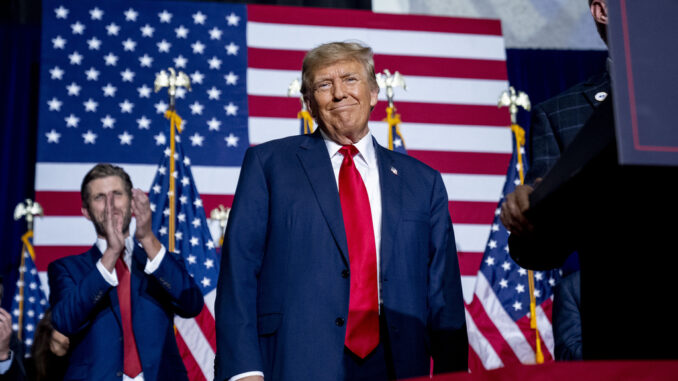
DES MOINES, Iowa — Former President Donald Trump scored a record-setting win in the Iowa caucuses on Monday with his rivals languishing far behind, a victory that affirmed his grip on the 2024 Republican presidential nomination.
In what was the lowest-turnout caucus in a quarter-century, participants endured life-threatening cold and dangerous driving conditions to meet in hundreds of schools, churches and community centers across the state. But those who ventured out delivered a roughly 30-point win for Trump that smashed the record for a contested Iowa Republican caucus with a margin of victory exceeding Bob Dole’s nearly 13-percentage-point victory in 1988.
Florida Gov. Ron DeSantis finished a distant second, ahead of former U.N. Ambassador Nikki Haley.
The results left Trump with a tighter grip on the GOP nomination, though it could take several more months for anyone to formally become the party’s standard bearer. The magnitude of Trump’s victory, however, posed significant questions for both DeSantis and Haley. Neither candidate appeared poised to exit the race, though they leave Iowa struggling to claim making much progress in trying to become Trump’s strongest challenger.
Having repeatedly vowed vengeance against his political opponents in recent months, Trump offered a message of unity in his victory speech.
“We want to come together, whether it’s Republican or Democrat or liberal or conservative,” he said. “We’re going to come together. It’s going to happen soon.”
The GOP contest moves swiftly to New Hampshire, which will hold the first-in-the-nation primary on Jan. 23. A shrinking field will compete there after entrepreneur Vivek Ramaswamy suspended his campaign after a disappointing fourth place finish and endorsed Trump.
DeSantis headed to South Carolina on Tuesday, a conservative stronghold where the Feb. 24 contest could prove pivotal.
“Because of your support, in spite of all of what they threw at us, we got our ticket punched out of Iowa,” DeSantis told supporters.
Haley plans to compete vigorously in New Hampshire, where she hopes to be more successful with the state’s independent voters.
“When you look at how well we’re doing in New Hampshire and in South Carolina and beyond, I can safely say tonight Iowa made this Republican primary a two-person race,” she said.
Initial results from eight counties showed Trump with far more than half of the total votes counted as of 7:31 p.m., with the rest of the field trailing far behind. These counties included rural areas that are demographically and politically similar to a large number of counties that had yet to report.
Trump showed significant strength among Iowa’s urban, small-town and rural communities, according to AP VoteCast. He also performed well with evangelical Christians and those without a college degree. And a majority of caucusgoers said they identify with Trump’s “Make America Great Again” movement.
One relative weakness for Trump comes in the suburbs, where only about 4 in 10 supported him.
Iowa has been an uneven predictor of who will ultimately lead Republicans into the general election. George W. Bush’s 2000 victory was the last time a Republican candidate won in Iowa and went on to become the party’s nominee.
About three-quarters of Iowans responding to AP VoteCast said the charges against Trump are political attempts to undermine him, rather than legitimate attempts to investigate important issues.
“God called us to do that to support Trump,” said 64-year-old David Lage, donning a captain’s hat at Trump’s victory party.


